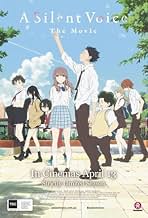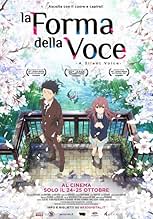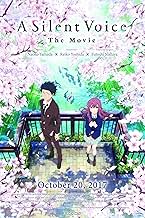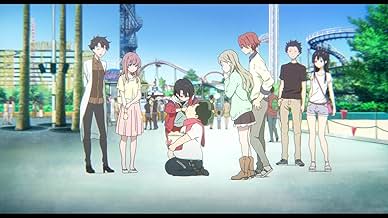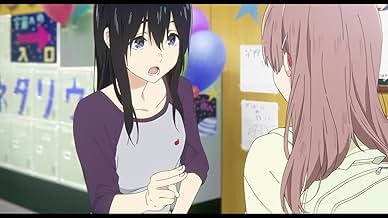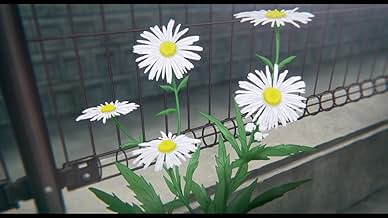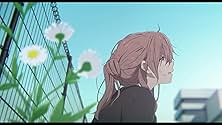A deaf girl, Shoko, is bullied by the popular Shoya. As Shoya continues to bully Shoko, the class turns its back on him. Shoko transfers and Shoya grows up as an outcast. Alone and depressed... Read allA deaf girl, Shoko, is bullied by the popular Shoya. As Shoya continues to bully Shoko, the class turns its back on him. Shoko transfers and Shoya grows up as an outcast. Alone and depressed, the regretful Shoya finds Shoko to make amends.A deaf girl, Shoko, is bullied by the popular Shoya. As Shoya continues to bully Shoko, the class turns its back on him. Shoko transfers and Shoya grows up as an outcast. Alone and depressed, the regretful Shoya finds Shoko to make amends.
- Awards
- 6 wins & 9 nominations total
- Shôya Ishida
- (voice)
- Shoko Nishimiya
- (voice)
- Yuzuru Nishimiya
- (voice)
- Tomohiro Nagatsuka
- (voice)
- Naoka Ueno
- (voice)
- Miyoko Sahara
- (voice)
- Miki Kawai
- (voice)
- Ito Nishimiya
- (voice)
- Maria Ishida
- (voice)
- Pedro
- (voice)
- Kazuki Shimada
- (voice)
- Director
- Writers
- All cast & crew
- Production, box office & more at IMDbPro
Summary
Featured reviews
Yamada and Kyoto Animation have produced one of the finest modern anime features in the last decade, enough to make me realise my erroneous judgements and how they have affected my so-called friends at the time. After nearly committing suicide, Shoya reflects back to his elementary school days where he bullied a young Shoko for her deafness. Having realised his insensitive approach, he attempts to make amends by befriending her and apologising.
This review may get personal, apologies in advance. Watching bullying makes me physically wretch. No one should be afflicted with that much pain and solidarity for being themselves. I've realised that for so long, believe me, as I myself was a bully. I even contacted my "friend" a few years ago to apologise profusely. But quite rightly, I received no response. Just an indication that it had been "read". In this story, Shoya represents me. So to witness the first act, whilst shedding a few tears almost instantly, was a hard-hitting yet tantalisingly emotional experience. The verbal, physical and downright inhumane abuse that Shoko received was enough to make me look away.
Overwhelmed with tainted reminiscence, Yoshida does not shy away from the original manga's poignant message. Transforming a grotesque bully into the sympathetic protagonist was always going to be tough. The audience has to feel his weakened mentality and earnest personality into wanting to right the wrongs he caused. Yoshida wrote every single character with a colossal amount of humanity. Never did it feel artificial, his longing for redemption. Never did it exhume desperation, the suicidal tendencies for the sake of melodrama. Never did it feel forced, the tangible romance blossoming between Shoya and Shoko. Beautifully written, gorgeously realised and touchingly human. The medium of anime rarely exceeds this level of writing. The sheer realism embedded within the animation made me weep tears atleast four times. Heck, I'm getting emotional just writing about the film! God damn!
Kyoto Animation have really outdone themselves in terms of capitalising on the source material's drawing style. Simply put, the animation was stunning. Faultless. From the majestic urban backdrop amidst a fireworks show, metaphorically symbolising the explosive fluctuating nature of mental instability, to the wonderfully drawn character models that expressively exhume a variety of emotions. Yamada intricately orchestrated the animation to create a frenetic narrative structure, complete with time shifts and illusory visions, alluding to the haphazard thinking during times of solitude. Arguably too frantic at the best of times, especially with abrupt scene transitions, but overall very well edited by Shigemura who utilises ripples to explore the vibrational impact of character actions.
The outstanding cinematography that creatively harnessed human body parts to reveal feelings, most notably legs, was memorable to say the least. Absolutely stunning. Intuitive details, for example implanting crosses on the faces of school peers that Shoya is outcasted by, further explored this idea of solitude. And rest assured, Yoshida never ventured into unnecessary melodrama. At no point did I feel forced to like Shoya, just because he wanted to walk down the path of redemption. It was all natural progression. The romance that carefully grows between Shoya and Shoko was exceptionally-well executed. The conclusion could've been cut tighter after the coma, however the film primarily revolved around Shoya as a character-changing venture, it was only fair the ending focused on him too. Oh, and the English dub wasn't irritating! Initially I had qualms with the deafened voice of Shoko, and aside from the crying, it was handled with earnest care.
The same can be said for the entirety of this anime feature. No matter if the story is relatable to the viewer or not, it is irrefutably beautiful. You will laugh. You will smile. And yes, you will cry. It's a journey that expressively explored every emotion available, and I can safely say it's a near-masterpiece.
While he was in elementary school, Shoya Ishida, in an effort to fit in with his fellow peers, teased and bullied a deaf girl in class named Shoko Nishimiya. However, this backfires on Shoya and he ends up being shunned by the other students as Shoko ultimately ends up transferring elsewhere. Now in high school, Shoya has felt constant remorse for his actions and attempts make things right with both Shoko and the classmates who ostracised him.
Poignant and beautifully animated, A Silent Voice is not only a well made anime film, but also an interesting commentary on the state of one's mental health and well-being. This film will likely strike a chord with anybody suffering from depression and/or anxiety who wish they could find a way to fix their past mistakes. Also, despite its serious tone, director Naoko Yamada still manages to insert some humorous and quirky comic relief at appropriate times, much in the vein of what was seen in K-On!, her previous work. The Japanese voice acting is solid, however it is Saori Hayami as the voice of Shoko Nishimiya who stands out the most. Her performance as a deaf girl was highly convincing and never seemed exaggerated or too comical. I have not yet seen the English dub but I plan to do so in the not-to-distant future.
I rate it 8.5/10
Egged on by his school mates, Shoya bullies the newly arrived Shoko, who happens to be deaf. Perceived to be receiving special treatment, and being different (a crime in Japanese society), Shoko is fair game for any number of cruelties. Until it goes too far.
This movie then takes a different approach. Instead of showing the bullied person's return to strength, it shows the traumatised bully (and his cohorts) as he seeks to recover from the horror he put Shoko through. You may balk at the thought, but the paths of Shoya and Shoko are explored in their later high school lives, both being treated sympathetically.
The animation is beautiful, the script manages to avoid typical Japanese cliche, and the story takes some shocking turns without relying on trite misery or emotional manipulation. If you miss Ghibli, give this a watch. You'll be happy to know the spirit of great Japanese animation lives on.
Without spoiling too much. I just really appreciate the believably of most of the film. Unlike Your Name where I found some parts to be overly cheesy or slow paced. A Silent Voice offers up nice character development and introduces a whole array of interesting side characters to the plot.
I do really like the idea of having a deaf friend. I've often thought about what that would be like and the whole learning sign language and writing on a book to communicate. It offers a-not often seen- perspective of that life. I found it quite invigorating and motivating to step up my own life.
Did you know
- TriviaShoko's English dub voice actress Lexi Marman is actually deaf in real life.
- GoofsDuring Ishida and Ueno's conversation at the crosswalk, Nishimiya is seen holding the pouch that Ishida had given to her as a gift. However, it disappears after Ueno sprints across the street and removes Nishimiya's earpiece; it is nowhere to be seen on her person or on the ground.
- Quotes
Miyoko Sahara: I couldn't change. I couldn't protect you again. I was the same coward.
Shoko Nishimiya: You can change from now on.
- Crazy creditsThough the official Roman-character title used on merchandise in Japan, and on the movie's posters, trailers, video boxes, video menus and so on in English-speaking countries is "A Silent Voice: The Movie" (often shortened to just "A Silent Voice"), the Roman-character title which appears on-screen in the full movie itself is instead "The Shape of Voice", which is an awkward mistranslation into English of "Koe no katachi".
- ConnectionsFeatured in Rule Britannia.exe (2018)
Details
- Release date
- Country of origin
- Official sites
- Languages
- Also known as
- The Shape of Voice
- Production companies
- See more company credits at IMDbPro
Box office
- Gross US & Canada
- $1,079,689
- Opening weekend US & Canada
- $121,732
- Oct 22, 2017
- Gross worldwide
- $30,819,442
- Runtime2 hours 10 minutes
- Color
- Sound mix
- Aspect ratio
- 1.85 : 1
Contribute to this page



